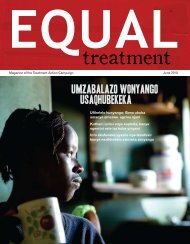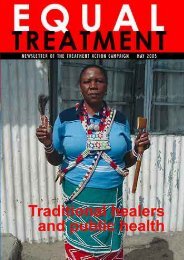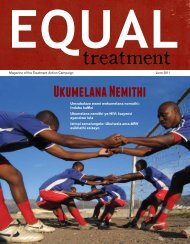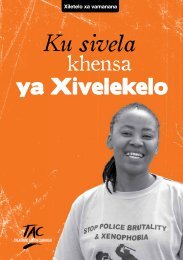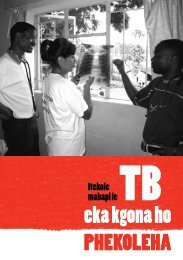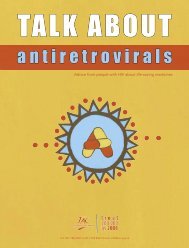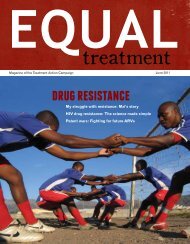ARV's in our lives[swiss].indd - Treatment Action Campaign
ARV's in our lives[swiss].indd - Treatment Action Campaign
ARV's in our lives[swiss].indd - Treatment Action Campaign
You also want an ePaper? Increase the reach of your titles
YUMPU automatically turns print PDFs into web optimized ePapers that Google loves.
16<br />
Human Immunodeficiency Virus (HIV) – how it beg<strong>in</strong>s<br />
to cause illness<br />
When asked to expla<strong>in</strong> what HIV is, some will say Ubhubhane, Ugawulayo, or Amagama Amathathu.<br />
With the exception of scientists and doctors, very few will say it is a germ. Many of us know it as the<br />
mysterious illness that 'took away my mother, my child, my cous<strong>in</strong> who was pay<strong>in</strong>g for my school<br />
fees’, as ‘an idliso (poison) from my jealous neighb<strong>our</strong> or the mysterious illness that is mak<strong>in</strong>g me<br />
th<strong>in</strong> and feel weak'. We all understand illness differently. However, one th<strong>in</strong>g rema<strong>in</strong>s – because of<br />
HIV, thousands of people are be<strong>in</strong>g lost to us.<br />
We spoke earlier about different types of germs and illnesses they cause. But all this talk about germs<br />
is foreign to some people, especially <strong>in</strong> rural areas. When we do education <strong>in</strong> the community and try<br />
to expla<strong>in</strong> germs, we hear many stories of how people culturally understand germs and disease.<br />
One woman <strong>in</strong> a workshop we did <strong>in</strong> Ngqurha <strong>in</strong> Eastern Cape said:<br />
‘I can hear all this talk about germs, but I tell you the reason my daughter is cough<strong>in</strong>g is because her<br />
uncle who is jealous of the fact that she went to get education <strong>in</strong> Fort Hare University sent his Impundulu<br />
to kick her <strong>in</strong> the chest at night and that is why she is cough<strong>in</strong>g blood, truly, that is why.’<br />
After listen<strong>in</strong>g to her, we realised that she was expla<strong>in</strong><strong>in</strong>g the symptoms of TB. She had taken her<br />
daughter to traditional healers who were all try<strong>in</strong>g to ward off the impundulu and do their best to<br />
alleviate her symptoms. But the TB would not go away. We spoke to both the daughter and the<br />
traditional healer who agreed that the young woman be taken to a cl<strong>in</strong>ic. The cl<strong>in</strong>ic diagnosed her<br />
with TB and she took Rifaf<strong>our</strong> for six months and got better.<br />
Another young woman <strong>in</strong> a treatment literacy workshop <strong>in</strong> Matatiele <strong>in</strong> Eastern Cape said:<br />
‘I hear all you people say. I know exactly what to do. I just need to slaughter a goat for my ancestors. My<br />
Sangoma told me that the reason I have abdom<strong>in</strong>al pa<strong>in</strong>, burn<strong>in</strong>g when I ur<strong>in</strong>ate and irregular menstruation<br />
is because I didn’t perform the ceremony to appease my ancestors. I will go back to my uncle’s kraal<br />
next week and he will slaughter the goat and I will be better.’<br />
In this case, we asked her Sangoma if she could conv<strong>in</strong>ce the woman to go to the cl<strong>in</strong>ic so that<br />
they can also see what might be wrong with her. The Sangoma expla<strong>in</strong>ed that she believed <strong>in</strong> her<br />
ancestors. But she was very understand<strong>in</strong>g and said all she wants is for the woman to get better<br />
and everyth<strong>in</strong>g that can work must be tried. It turned out the woman had gonorrhea, a sexually<br />
transmitted disease (STD) also called iDrop, which had not been treated for a long time. She got<br />
treatment – ciprofloxac<strong>in</strong> – and got better.<br />
When we do not understand th<strong>in</strong>gs, we f<strong>in</strong>d <strong>our</strong> own ways to <strong>in</strong>terpret what is go<strong>in</strong>g<br />
on. This is true about disease and all other th<strong>in</strong>gs which happen <strong>in</strong> communities.<br />
There is noth<strong>in</strong>g wrong with f<strong>in</strong>d<strong>in</strong>g <strong>our</strong> own, culturally relevant ways to understand<br />
the causes of illness. The problem is that sometimes, even though <strong>our</strong> own ways


![ARV's in our lives[swiss].indd - Treatment Action Campaign](https://img.yumpu.com/4307152/24/500x640/arvs-in-our-livesswissindd-treatment-action-campaign.jpg)
